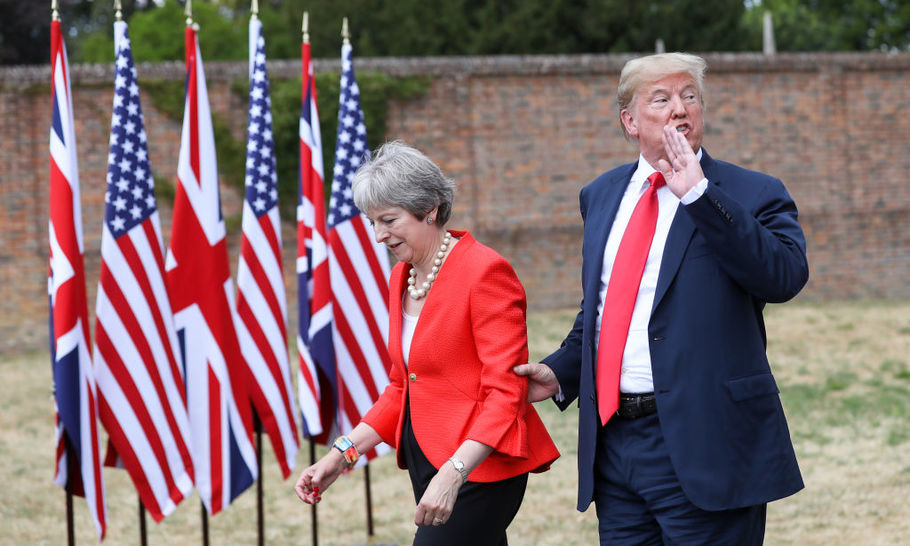Trump is forcing Mrs May to make up her mind: whose side is Britain on?

Chris Ratcliffe/Bloomberg via Getty Images
It’s decision time for the Special Relationship. Britain is being forced to choose between America and Europe on the crunch issues of China and Iran. The logic of Brexit dictates that the UK should make use of its new-found strategic and diplomatic independence to preserve the Atlantic alliance. But we are still in the EU and the Foreign Office habit of deferring to its European partners dies hard. Washington, though, is unwilling to let us sit on the fence.
On Iran, the Obama administration allowed the Europeans plenty of wriggle-room. Both Hillary Clinton and John Kerry avoided confrontation at all costs. Not so Donald Trump. One of his first acts was to tear up Obama’s signature policy, the Iran deal. After two years surrounded by risk-averse generals and businessmen, he appointed two hawks to take charge of his foreign policy: John Bolton as National Security Adviser and Mike Pompeo as Secretary of State.
Now the President has turned up the heat on Iran. He has taken Bolton’s advice to dispatch a carrier battle group to the Gulf, in response to a potential threat to US assets in the region. Iran responded immediately by threatening to resume building nuclear weapons. Meanwhile Pompeo went to London with a simple message to the Europeans: if you are not for me, you are against me. Standing alongside Jeremy Hunt, the Foreign Secretary, he warned that European firms doing business with Iran risk being punished by the US: “If the transaction is sanctionable there will be sanctions against those involved in that transaction.” The warning applies to governments, too, as Hunt evidently realises. He criticised the Iranian decision to restart uranium enrichment, but there was a carrot as well as a stick: “Should Iran cease to observe its nuclear commitments, there would of course be consequences. For as long as Iran keeps its commitments, then so too will the United Kingdom.”
In dealing with Iran, Pompeo and Bolton don’t believe in carrots. They refuse to speak softly and they carry a big stick. The Islamic Republic is indeed uniquely vile towards its own citizens and menacing towards its neighbours. Two examples: Nasrin Sotoudeh, an Iranian lawyer who defended the right of women to remove the hijab, has just been jailed for 38 years and given 148 lashes. This is the world’s only regime that officially espouses anti-Semitism and repeatedly threatens to annihilate the Jewish state. Yesterday Israel’s Prime Minister, Binyamin Netanyahu, repeated his warning that Israel will not tolerate a nuclear-armed Iran. Any likely successor to Netanyahu would abide by that pledge.
Iran is dangerous, but it is also relatively weak — unlike the China of Xi Jianping. In a week when Trump is threatening to raise the stakes in his trade war with Beijing, Britain is being pushed by the US to change its mind about technological dependency on Huawei. The dispute has already split the Cabinet and cost Gavin Williamson his job. Now the US Secretary of State has ratcheted up the pressure on Theresa May by contrasting her unfavourably with her only female predecessor in office.
Alluding to the controversy in a speech at Lancaster House, Pompeo invoked the shade of Margaret Thatcher. “Ask yourself this: would the Iron Lady…allow China to control the internet of the future?” It’s a good, if undiplomatic, question — though an ungallant one. Can one imagine Hunt giving a speech in Washington that made an unflattering comparison of President Trump with, say, Ronald Reagan? But Pompeo said it, because he can get away with it.
Less than a month before his state visit, the President has put the Prime Minister on the spot. She may give him a cool reception, but the heat is on her. Whose side in the Middle East do we want to be on — Iran’s or Israel’s? Do we still value our much-envied membership of the Five Eyes intelligence-sharing partnership, as Hunt insists — even if that means sacrificing the speed and cost-saving that Huawei promises the new 5G network “for the security imperative”, as Mrs May reportedly refuses to do? Is Britain going to be predominantly Atlanticist after Brexit — or remain European in all but name? Mrs Thatcher knew whose side she was on. The present Prime Minister may try to put off this fateful choice. Her successor won’t be able to do so.





